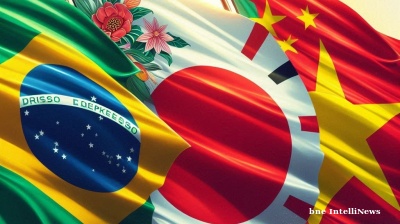US President Donald Trump has announced a new reciprocal tariff policy for Latin American countries, imposing a baseline 10% rate on imports from most nations in the region, including Brazil, while implementing higher rates on Venezuela (15%), Nicaragua (18%) and Guyana (38%).
During what he called "Liberation Day" to restore the US’ "Golden Age" on April 3, Trump displayed a global chart showing the tariff rates to be applied to each country's exports to the US.
"It's our declaration of independence," the president told reporters in the White House Rose Garden.
According to the Republican leader, the new policy will bring jobs and economic growth to the US.
Trump described the new rates as a "discount", claiming they represent roughly half of what these countries charge on US imports.
While most Latin American nations breathed a sigh of relief, Washington's leftist foes in the region – the Venezuelan regime under Nicolás Maduro and Nicaragua under Daniel Ortega – were slapped with higher tariffs, as they reportedly impose the highest duties on American products – 29% and 36%, respectively. Cuba, along with other heavily sanctioned countries such as Russia and North Korea, was not included on the list.
Surprisingly, oil-rich Guyana, a country traditionally aligned with the US, was punished with a whopping 38% levy – one of the world's steepest.
“The Government of Guyana has taken note of the reciprocal tariffs announced by the US. Our government is closely engaged with our US partners to better understand the issue and have it addressed as appropriate,” the Guyanese government stated.
Bolivia, another country whose government under Luis Arce has tensions with the US, will be subject to the standard 10% rate, despite reportedly imposing 20% duties on US goods.
For Brazil, the region's powerhouse, the White House said the 10% tariff matches what it calculates the country currently applies to US imports, a figure that includes trade barriers and currency manipulation, according to US assessments.
Trump set 10% as the minimum tariff level, deviating from the "half rate" principle when it would have resulted in fees below this threshold.
Had the rule been strictly followed, several Latin American countries including Brazil, Chile, Argentina, Costa Rica and Ecuador would have faced lower rates between 5% and 9%.
Meanwhile, Mexico was left out of the list, escaping the harshest of these measures thanks to the US-Mexico-Canada Agreement (USMCA) negotiated by Trump during his first tenure in 2018.
The US president said he expects "a flood of phone calls from presidents, prime ministers, kings, queens and ambassadors asking for exceptions” to the tariffs.
According to Estadao, Brazil is planning to seek exemptions, with a virtual meeting being scheduled between Brazilian and US trade officials in the next few days. The government said it was "evaluating all possible actions to ensure reciprocity in bilateral trade, including resorting to the World Trade Organization," as reported by Reuters.
Far from standing idle, Brazil's Congress swiftly reacted by fast-tracking a bill allowing the government to impose reciprocal trade and environmental measures.
US trade surplus with Brazil in 2024 reached $7bn in goods, $28.6bn when including services, Brazilian officials said, ranking among the largest US trade advantages globally.
"The assertion that new tariffs aim to restore balance lacks factual support given this longstanding and significant surplus," the foreign ministry stated.
Overall, Trump argues these reciprocal tariffs target countries that "treat the US badly" and will only be lifted for those who establish manufacturing facilities in the US and stop devaluing their currencies.
"Eliminate your tariffs, reduce your barriers, don't manipulate your currencies, buy billions of dollars in American products and give us protection against economic losses," he demanded.
News

Iranian MP warns Trump is bluffing with threats against Tehran
Abolfazl Zohrehvand, a member of the National Security and Foreign Policy Commission of Iran's 12th Parliament, has said that US President Donald Trump is using threats as a method to advance his goals regarding the country.

Kremlin envoy Dmitriev says “significant progress” made in talks during Washington trip
Russia and the US have made significant progress in discussing a settlement of the conflict in Ukraine, Russian Direct Investment Fund CEO and Special Envoy Kirill Dmitriev said during a visit to Washington on April 3.

Benjamin Netanyahu lauds Hungary’s support for Israel in ICC row, anti-Semitism fight
Israeli Prime Minister Benjamin Netanyahu praised Hungary's "remarkable" support for Israel and the global Jewish community during a joint press conference in Budapest.

Romania braces for indirect fallout from US tariffs, plans targeted support
Prime Minister Marcel Ciolacu has announced support measures for the worst hit industries, but the fiscal resources are scarce.




